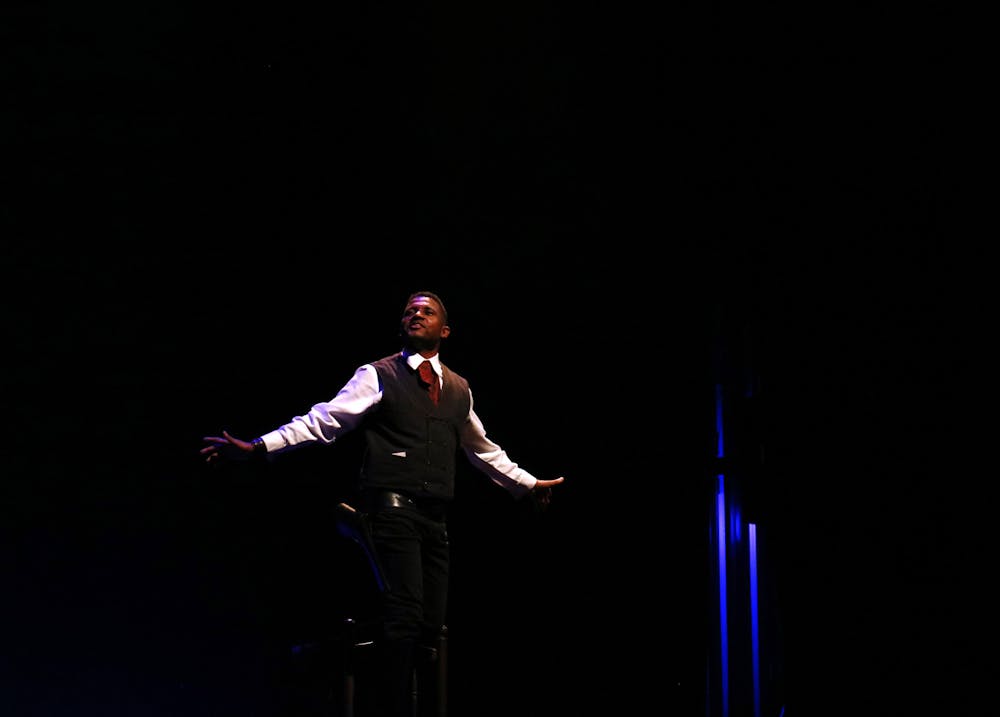While sixth grade may evoke memories of braces, bus rides and physical education class, Mike Wiley looks back on it as the year he discovered his life’s passion.
“I started acting when I was in the sixth grade,” Wiley said. “I played Abraham Lincoln in our school play. At first, I wasn’t interested in playing the role because I was at a new school and I felt like I would be an oddball if I played a white man on stage.”
When he put on his Lincoln costume and played the part, he fell in love with creating characters. This would be the start of a long journey in acting and performance for Wiley.
Wiley has dedicated his career to his mission of sharing stories of Black Americans in the form of educational theater, and in particular one-man shows. He found that there was a limited selection of roles for African American men and took matters into his own hands by creating his own performances and production company.
Wiley performed a one-man show for his second consecutive year in McCrary Theatre at Elon University Sept. 18. This year he performed “The Fire of Freedom” based on David Cecelski’s book. The performance tells the story of Abraham Galloway, an abolitionist and Union spy who became a significant figure during the Civil War. He later became one of the first Black men elected to the North Carolina legislature.
“Galloway never stopped being the kind of character you saw in this play,” Wiley said. “He never stopped speaking his mind.”
Wiley performs eight plays featuring various African American stories — through which, he has introduced audiences to the stories of important African American figures. One such person is Emmett Till, whose story was featured last year at Elon University.
Wiley’s solo work began in 1998 when he did research for his first play as a solo endeavor titled “One Noble Journey,” which he performs to this day. The play is based on the story of Henry “Box” Brown, an enslaved African American who escaped by shipping himself in a wooden box.
Wiley’s unique approach to theater demonstrates an immersion of education and performance. One-man shows leave the bulk of the pressure on the shoulders of the main performer. Wiley said he alleviates this by involving the audience. This includes using audience members as actors, which brings a new experience to both him and the audience every show.
“I felt because I could perhaps make history walk and talk, students would have a deeper understanding of the contributions of Black Americans,” Wiley said.

Mike Wiley invites a student on stage to participate in his show, “The Fire of Freedom” at McCrary Theatre on Sept. 18. The show follows the story Abraham Galloway and his efforts to free slaves during the Civil War.
At the end of show, audience members were able to ask Wiley questions. Even viewers who didn’t anticipate enjoying a solo performance reflected positively on the experience. Patrick Tuohy, an Elon University sophomore, shared his thoughts on the show.
“The use of one actor helped to portray the material more honestly and genuinely than I would have expected,” said Tuohy.
Some professors at Elon have encouraged students to attend Wiley’s performances. Sara Sussman, a sophomore at Elon, was happy that her professor last year required the class to watch Wiley’s performance of “Dar He: The Story of Emmitt Till.” She said that she learned a story she otherwise wouldn’t have been familiar with.
This also raises broader questions about diversity on Elon’s campus as a whole. Some students at Elon reflected on having a hard time experiencing diverse art forms with Elon’s student body being close to 80% white. Meg Morton, a junior at Elon University, shared her experiences.
“It’s very difficult for people of color to find organizations that they are comfortable and supported in, so it’s hard to find that culture and community,” said Morton.
Wiley shared his advice for students at predominantly white universities wanting to support Black artists and creators. He suggested finding artists within and outside of the Elon community.
“Go off campus yourselves and experience art and artists made by and presented by persons of color,” Wiley said.
Wiley’s appreciation for art goes beyond theater and performance. He earned a master’s degree in fine arts from the University of North Carolina, Chapel Hill. Additionally, he served as the Lehman Brady visiting joint chair professor in documentary studies and American studies at both Duke University and UNC.
Wiley said he is currently the Assistant Research Professor of Arts, Ethics and Education in the Education Program at Duke. He has appeared on a variety of television networks, including Discovery Channel and National Geographic Channel. Wiley said he doesn't care about fame, but he does care about the legacy he leaves in his work.
“My goal has always been to share the untold and under-told stories of Black Americans so that those who aren’t familiar with our sacrifices, ingenuity and resilience can deepen their perspective and understanding of our history,” Wiley said.


